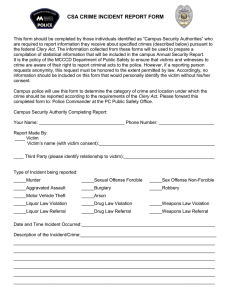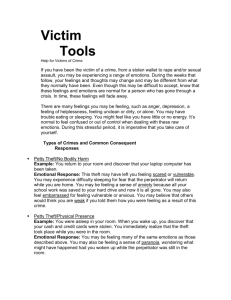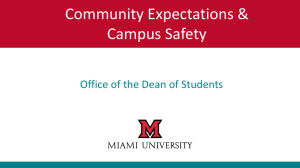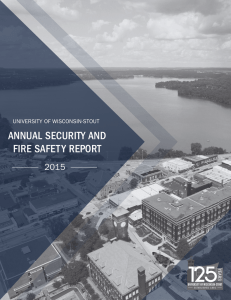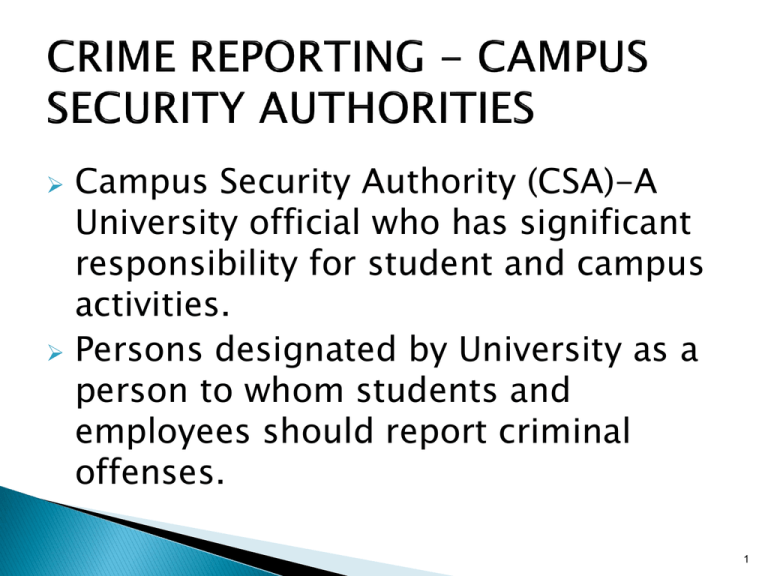
Campus Security Authority (CSA)-A
University official who has significant
responsibility for student and campus
activities.
Persons designated by University as a
person to whom students and
employees should report criminal
offenses.
1
Resident Assistants
and
Professional Residence Life Staff
are
Campus Security Authorities
2
9 MAJOR CRIME CATEGORIES
Aggravated Assault, Arson, Burglary,
Manslaughter (Negligent), Murder and NonNegligent Manslaughter, Motor Vehicle Theft,
Sex Offenses-Forcible, Sex Offenses-NonForcible (Incest & Statutory Rape)
3
14 HATE CRIME CATEGORIES
All of the 9 Major Crime Categories
Plus Any Other Hate Crime Involving
Bodily Injury, Larceny-Theft, Simple
Assault, Intimidation, and
Destruction, Damage or Vandalism
of Property.
4
Three Distinct Geographical Locations
On-Campus – Any Building or property owned or
controlled by the institution within the same
reasonably contiguous geographic area and used
by the institution in direct support of or in a
manner related to the institutions educational
purpose including residence halls.
Note: Residence Halls are a reporting subset of
on-campus
5
Non-Campus
Any building or property owned or controlled by a
student organization that is officially recognized by
the institution (i.e., fraternities)
and
Any building or property owned or controlled by an
institution that is used in direct support of, or in
relation to the institutions educational purpose, is
frequently used by students and is not within the
same reasonably contiguous area.
6
Public Property
All Public Property, including
thoroughfares, streets, sidewalks, and
parking facilities, that is within the
campus or immediately adjacent to and
accessible from the campus.
Note: Each Campus (including foreign
campuses) is reported separately.
7
When you receive a report of a crime
contact MUPD immediately!
No police report/investigation is
required for the crime report to be
included in statistics.
8
University must determine whether
to issue an Emergency Notification or
Campus Crime Alert to the campus
community.
9
Emergency notification is used for those
situations that pose an immediate threat to
the health or safety of students or employees
on campus or for the closing of an entire
campus (i.e., severe weather, chemical spills,
fires, and crimes).
Messages about criminal activity will be sent
using these systems only if there is an
imminent threat of danger.
10
Crime Alerts will be issued for all
crimes covered by the Clery Act that
are reported to campus security
authorities or local police agencies
and considered by the University to
represent a threat to students and
employees.
11
Resident Assistants and Professional
Residence Life Staff have additional
responsibilities, under Title IX, to
report sexual assaults to MUPD.
12
Miami University will preserve student
confidentiality to the extent possible
and allowed by law.
The degree to which confidentiality can
be promised, however, depends upon
whether or not the person to whom the
sexual assault is reported is legally
required to report.
13
Resident Assistants and Professional Residence
Life Staff, are required to report sexual assaults
to MUPD who, in turn, will report it to the Dean
of Students, the University’s Deputy Title IX
Coordinator for Student Sexual Assault.
The person (RA or FYA) being consulted by the
victim should make these limits clear before
any disclosure of facts.
14
15
A victim can speak confidentially with certain
persons at Miami University including:
Counselors at Student Counseling Service
(529-2423)
Medical staff at the Student Health Center
(529-3000)
Off-campus counselors, physicians and
the Butler County Rape Crisis Program at
(523-4146)
16
If reported to you - Call MUPD which will dispatch
an officer to take a report. You should also offer to
accompany and assist the victim in:
1. Obtaining Emergency Medical Care
2. In Making Police Report
3. In Filing a Disciplinary Complaint if Alleged
Assailant is a Student
4. In connecting with the Dean of Students’
Office
17
If
Emergency - Call 911
Medical
Assistance - McCulloughHyde Memorial Hospital (523-2111)
Butler
County Rape Crisis Center (24
hour hotline - 523-4146)
18
This
is different from reporting the assault
to MUPD for Clery purposes.
Even
if the victim does not want to make a
police report – you must notify MUPD. Ohio
law and University policy require you to
report to police (emergency call 911 or
529-2222 for non-emergency).
19
If
the alleged assailant is a student, victim
may file a disciplinary complaint against
the student. No criminal complaint or
investigation is necessary.
Contact
Susan Vaughn, Director of the
Office of Ethics and Student Conflict
Resolution (529-1417).
20
Sexual Assault Prevention and Response
Program (529-1870)
Miami University - Counseling Service (5292423)
Student Health Service (529-3000)
Women’s Center (529-1510)
21
Make Changes to the Victim’s Academic and
Living Conditions – options include:
Change in residence hall so that the victim and
alleged perpetrator do not share the same
residence or dining hall
Safe-Room
Change in class assignment so that the victim
and alleged perpetrator do not share the same
classes
Academic Support Services - such as tutoring
22
College students have the right to:
1. Control the disclosure of their "education
records" to others;
2. Inspect and review their own "education
records;" and
3. Seek amendment of their "education
records."
23
. . . means those records that are:
1. Directly related to a student; and
2. Maintained by an educational
agency or institution or by a party
acting for the agency or
institution.
24
"any information recorded in any way,
including, but not limited to, handwriting,
print, computer media, video or audio tape,
film, microfilm, and microfiche."
Note: Personal knowledge is not a "record,"
and thus not an "education record," and thus
not subject to FERPA. (Be careful when
dealing with information that is both within
your personal knowledge and recorded in
some other format, however, as it will not
always be clear which you are relying on.)
25
Disclosures of educational records generally
take one of three forms –
to the student to inspect or seek amendment;
to a person or entity with the written consent of
the student;
or
to a person or entity without the prior written
consent of the student as permitted by 34 C.F.R.
99.31.
26
Directory Information - unless the student
has requested, in writing, that all or any
portion of those items designated as
directory information not be disclosed.
Another University Official - To an internal
university official who has a legitimate
educational interest in the information.
Parents or Guardians - To a parent or legal
guardian of a dependent student, as defined
by the I.R.C.
27
1. Get Consent
2. Connect the Student and Parent
3. Answer for Processes/Policies/Procedures
28

